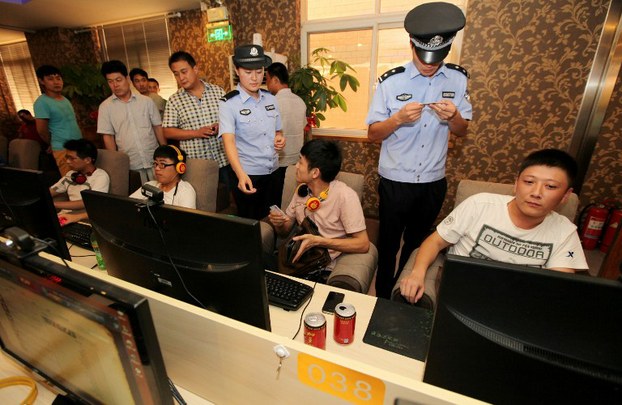
Police check the ID cards of netizens at an Internet cafe in Shandong province, July 31, 2013. Imagine China
An outspoken Chinese website that specialized in wide-ranging political and economic analysis remained unavailable on Tuesday, three days after going offline, amid an ever-tightening crackdown on public spaces for debate.
Three days after going offline, the Gongshiwang, or ConsensusNet, site returned a message saying “This site is currently upgrading, and has temporarily closed for updates. We apologize for the inconvenience.”
The website’s owners, Consensus Media Group, has already seen the closure of one of its magazines and a management reshuffle at another, although there has been no official announcement on the status of its website.
Founded in September 2009 to curate reports and analysis by both left- and right-wing thinkers on the topics of the day, the site now appears to have an uncertain future.
Its founder Zhou Zhixing has told journalists he has no idea when it will be back online.
Nanjing-based writer and ConsensusNet reader Jiang Chun said he sees the closure of the site as being linked to the enforced management takeover of reform-minded political journal Yanhuang Chunqiu earlier this year.
“I am personally extremely angry about this,” Jiang said. “The website … developed to be very well run, and I am guessing that, like Yanhuang Chunqiu, it won’t be coming back.”
Round-the-clock monitoring
China’s powerful internet regulator in August ordered all websites to start round-the-clock monitoring of content, holding editors personally responsible for “problem” content not in line with official narratives issued by the ruling Chinese Communist Party.
As well as the Yanhuang Chunqiu takeover, during which a fresh management team moved in to camp round the clock in the magazine’s Beijing offices, authorities also detained a number of writers and editors at online news portal Wujie after a mysterious and anonymous call for Xi’s resignation was posted to its website in March.
China has already moved to ban the country’s internet portals like Tencent and Sina from conducting any independent journalism of their own, requiring them to post syndicated content from the state-run Xinhua news agency and state broadcaster CCTV instead.
Jiang said he expects more websites to meet a similar fate.
“I’m guessing that maybe even more websites are going to go down, especially those that specialize in analysis and ideology,” he said.
“Then, when they’re all gone, there’ll only be one kind of text to read: Xinhua news copy.”
A wider phenomenon
Political commentator Liang Jing said the apparent closure of ConsensusNet seemed to be part of a much wider phenomenon.
“Ever since Xi Jinping came to power, Chinese intellectuals have been plunged into a recurring nightmare,” he wrote in a commentary broadcast on RFA’s Cantonese Service.
“The recent blocking of ConsensusNet certainly gives one that kind of feeling.”
Liang linked the recent media clampdowns to Xi’s ideology of “self-confidence,” which is in turn linked to Beijing’s growing clout on the world stage and rejection of “Western” or “foreign” notions like human rights, democracy, and judicial independence.
And according to economist Wen Kejian, the closure of ConsensusNet is the logical next step after the takeover at Yanhuang Chunqiu.
“This is a logical step in a process in which political thought is becoming more and more extremist,” Wen told RFA.
“Not only is there no consensus to speak of in Chinese society, China is now embarking on the road of discrimination based on political thinking, from which there will be no coming back,” he said.
“And as more and more people become aware of this tragic truth, they will start to make stark choices.”
Independent Chinese PEN member Liu Jingsheng agreed, saying that the closure of the site marks an ever-diminishing public space for thinking and debate in China.
Ever-tightening controls
“This isn’t an isolated incident,” Liu said. “Aren’t messages sent on [smartphone chat app] WeChat now accepted as admissible evidence in court?”
“Controls on [speech] are getting tighter and tighter, and they have to act this way so as to remain in control of all propaganda channels,” he said.
Reported by Yang Fan for RFA’s Mandarin Service, and by the Cantonese Service. Translated and written in English by Luisetta Mudie.
Source: http://www.rfa.org/english/news/china/offline-10042016110900.html
